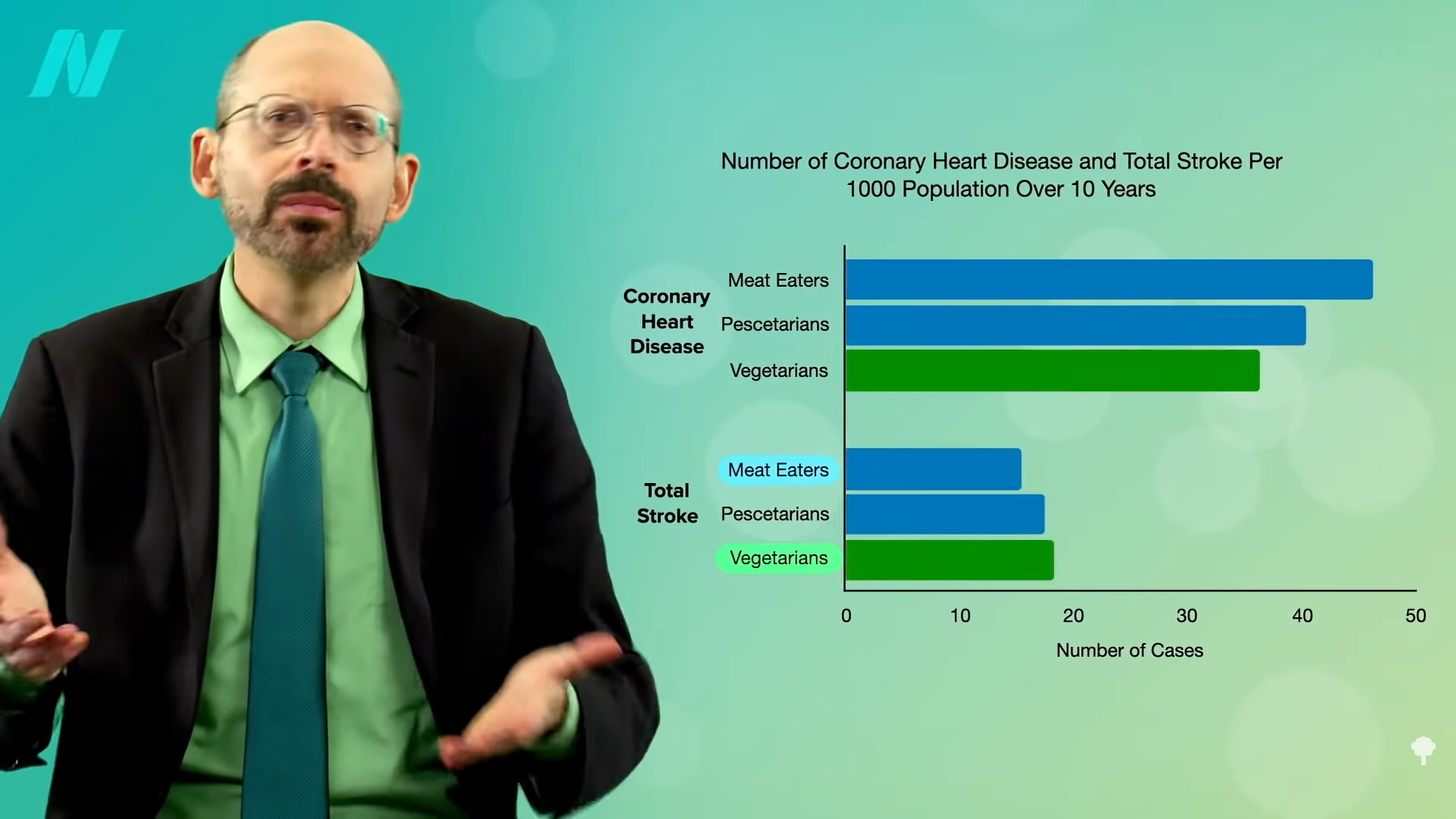Might animal protein-induced increases in the cancer-promoting growth hormone IGF-1 help promote brain artery integrity?
In 2014, a study on stroke risk and dietary protein found that greater intake was associated with lower stroke risk and, further, that the animal protein appeared particularly protective. Might that help explain why, as shown in the graph below and at 0:31 in my video Vegetarians and Stroke Risk Factors: Animal Protein?, vegetarians were recently found to have a higher stroke rate than meat eaters?

Animal protein consumption increases the levels of a cancer-promoting growth hormone in the body known as IGF-1, insulin-like growth factor 1, which “accelerates the progression of precancerous changes to invasive lesions.” High blood concentrations are associated with increased risks of breast, colorectal, lung, and prostate cancers, potentially explaining the association between dairy milk intake and prostate cancer risk, for example. However, there are also IGF-1 receptors on blood vessels, so perhaps IGF-1 promotes cancer and brain artery integrity.
People who have strokes appear to have lower blood levels of IGF-1, but it could just be a consequence of the stroke rather than the cause. There weren’t any prospective studies over time until 2017 when researchers found that, indeed, higher IGF-1 levels were linked to a lower risk of stroke—but is it cause and effect? In mice, the answer seems to be yes, and in a petri dish, IGF-1 appears to boost the production of elastin, a stretchy protein that helps keep our arteries elastic. As you can see in the graph below and at 1:41 in my video, higher IGF-1 levels are associated with less artery stiffness, but people with acromegaly, like Andre the Giant, those with excessive levels of growth hormones like IGF-1, do not appear to have lower stroke rates, and a more recent study of dietary protein intake and risk of stroke that looked at a dozen studies of more than half a million people (compared to only seven studies with a quarter million in the previous analysis), found no association between dietary protein intake and the risk of stroke. If anything, dietary plant protein intake may decrease the risk of stroke.

However, those with high blood pressure who have low IGF-1 levels do appear to be at increased risk of developing atherosclerosis, which is the thickening of the artery walls leading up to the brain, but no such association was found in people with normal blood pressure. So, there may be “a cautionary lesson for vegans” here. Yes, a whole food, plant-based diet “can down-regulate IGF-1 activity” and may slow the human aging process, not to mention reduce the risk of some of the common cancers that plague the Western world. But, “perhaps the ‘take-home’ lesson should be that people who undertake to down-regulate IGF-1 activity [by cutting down on animal protein intake] as a pro-longevity measure should take particular care to control their blood pressure and preserve their cerebrovascular health [the health of the arteries in their brain] – in particular, they should keep salt intake relatively low while insuring an ample intake of potassium” to keep their blood pressures down. So, that means avoiding processed foods and avoiding added salt, and, in terms of potassium-rich foods, eating beans, sweet potatoes, and dark-green leafy vegetables.
Might this explain the higher stroke risk found among vegetarians? No—because dairy and egg whites are animal proteins, too. Only vegans have lower IGF-1 levels in both men and women, so low levels of IGF-1 can’t explain why higher rates of stroke were found in vegetarians. Then what is it? I think the best explanation for the mystery is something called homocysteine, which I cover next.
If you aren’t familiar with IGF-1, my videos Flashback Friday: Animal Protein Compared to Cigarette Smoking and How Not to Die from Cancer are good primers.
Beyond eating a plant-based diet, how else can we lower our blood pressure? Check out the chapter on hypertension in my book How Not to Die at your local public library.
This is the eighth video in a 12-part series on vegetarians’ stroke risk. If you missed any of the previous ones, check out the related posts below.
Coming up, we turn to what I think is actually going on:







